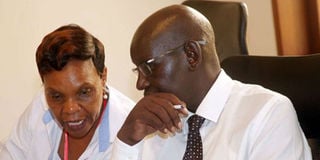High rate of exams failure calls into question quality of trainee teachers

Education PS Belio Kipsang confers with Ms Wanja Ekubo during the Kenya Teachers Colleges Principals Association conference in Mombasa on November 12, 2018. PHOTO | LABAN WALLOGA | NATION MEDIA GROUP
What you need to know:
- Private colleges recorded the highest number of failures in teachers'
- A total of 12,388 candidates got credit scores while 5,581 had pass scores.
- Some 807 candidates, or 2.69 per cent, did not meet course requirements.
Almost half of teacher trainees who sat this year’s final examinations failed, raising concerns over the quality of teachers that are joining the profession.
The development comes in the wake of concerns by the Teachers Service Commission (TSC) on subject mastery by teachers across the country.
A total of 10,457 out of 29,530 candidates will have to resit the examinations next year compared to 12,438 who failed last year. That means that the candidates will have to wait until next year to do supplementary examinations.
PTE EXAMS
Only 21 candidates attained distinctions in this year’s Primary Teachers’ Education (PTE) examination, a few months after the Ministry of Education lowered entry grades to teacher training colleges from C to D+ in order to benefit 17 marginalised counties.
Private colleges recorded the highest number of failures. A total of 12,388 candidates got credit scores while 5,581 had pass scores. Some 807 candidates, or 2.69 per cent, did not meet course requirements.
“This is because the continuous assessment marks for these candidates were not submitted by their colleges to facilitate computation of their final grades,” read the report by Kenya National Examinations Council (Knec). A total of 266 candidates, or 0.89 per cent, failed and will have to retake all papers next year.
PTE examination is administered at certificate level at the end of a two-year course. The minimum entry requirement for the primary teacher education examinations is KCSE mean grade C for regular candidate and C- for candidates with special needs (hearing-impaired and blind candidates).
The PTE examination is examined in 14 subjects which are tested in 21 papers and teaching practice. During the 2018 PTE examinations, a total of 11,651 male and 17,879 candidates sat for the examination as compared to 10,402 male and 13,646 female candidates who sat the examination in 2017.
REPORT
"This represents an increase of 12.01 and 31.02 per cent for male and female candidates respectively,” the report says.
The number of candidates who sat for the PTE examinations increased from 24,454 candidates in 2017 to 29,530 in 2018, an increase of 20.76 per cent. In the five-year period under review, there have been more female than male candidates.
There was an increase in the overall percentage of candidates attaining a pass and above in 2018 (18.61 per cent) compared to 2017 (10.30 per cent).
Data for the last five years indicate that 2017 had the highest number of candidates who failed at 12,438 while 2016 had 6,267, 2015 had 4,358 and 2014 had 2,074.
Speaking in Mombasa recently, Education Principal Secretary Belio Kipsang challenged the managers of teacher training colleges to improve the quality of training programmes to ensure people joining the teaching profession had the requisite knowledge and professional ability to give quality instruction to learners.
“The quality of education in any country is as good as its teachers,” Dr Kipsang noted. He said that, while instructional materials were important to education, learners rely on the teachers to make the best use of course materials.
Dr Kipsang made the remarks during the Kenya Teachers Colleges Principals Annual Conference at a Mombasa Hotel.
The association chairman Saul Barasa said there is need to review the PTE curriculum which was last done in 2005.
On the question of minimum entry qualifications, Dr Kipsang said that the quality of training in the colleges was crucial to ensuring that teachers have the best education and training.





